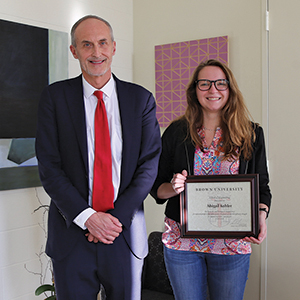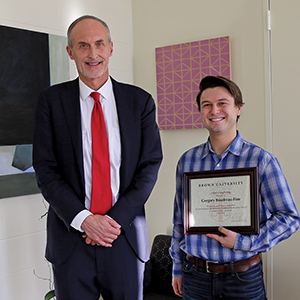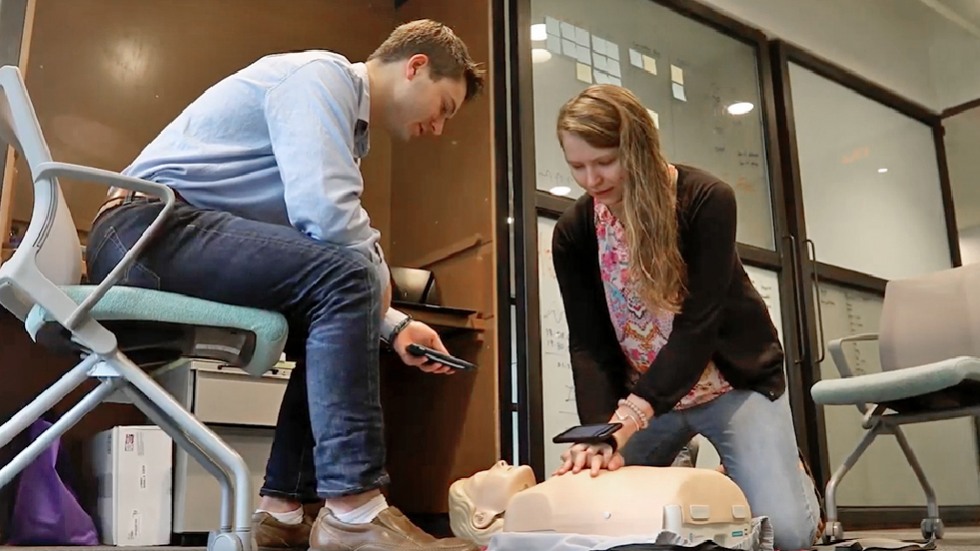For more than a year, engineering’s Abbie Kohler ’20 and Greg Boudreau-Fine ’20 have been developing a wearable aid to provide real-time feedback during a cardiopulmonary resuscitation emergency procedure. Dubbed ResusciTech, the duo formulated their business plan with the help of the Brown Breakthrough Lab last summer, and were just beginning the user testing phase before being interrupted by COVID-19.
ResusciTech is developing a novel smartphone app called CPR Now that gives real-time feedback on CPR chest compression quality. Currently, emergency resuscitation has only a 40 percent rate of success, primarily because of failure to follow CPR guidelines. Rescuers are often stressed and become fatigued, making it difficult to maintain the required compression depth and frequency. Studies indicate that this could be improved significantly by providing real time feedback to first responders, helping them adjust their compressions to give victims the best chance of survival. Kohler and Boudreau-Fine’s app aims to do this by using a proprietary design and simple user interface that is streamlined for rescuers to use in emergency situations. This would result in higher rescuer confidence in their performance of CPR, as well as increased quality of care and survival rate for victims of cardiac arrest.

“Our goal was to have a device that’s really easy to read and that tells the person doing CPR in real time how they’re doing,” Kohler, a biomedical engineering concentrator said. “Are they doing the compressions deep enough? Is the rate of compressions adequate in order to maintain blood perfusion to the brain? Because without any source of feedback it’s very difficult to understand what 2 to 2.4 inches deep into the chest looks and feels like.”
Electrical engineering concentrator Boudreau-Fine added, “And by having this technology available as a smartphone app, it enables anyone to use it anywhere and anytime there is an emergency.”
In March, just as Kohler and Boudreau-Fine were moving into their new workspace at the Cambridge Innovation Center (CIC) on Dyer St. in Providence (courtesy of a New England Medical Innovation Center grant), word came that students were shifting to online classes to complete the spring semester, and the CIC temporarily shuttered its doors. “That created a few roadblocks,” Kohler conceded. “But it also created a couple of opportunities. We had to cancel a formative study we had planned, and postpone much of our in-person user interface/user experience testing. We learned fairly quickly that people, particularly essential workers, were struggling to find CPR training during this time.” Those classes are almost always in person because of the required instructor evaluation of skills. ResusciTech’s training app can perform this same task with just a smartphone.
“We’d thought about training before, but then we realized this could be a really good time to use our technology to create a training program because we can perform remote skill evaluation,” she said.

Boudreau-Fine said, “This training program uses the exact same core technology to evaluate and give CPR feedback on real people, on dummies.”
Overall, ResusciTech’s venture will likely be impacted from six months to a year. “It’s unfortunate,” Kohler said. “But that’s due not just to the (transition to the) training program, but also because of limited capability to do user testing right now, which is a huge part of the FDA clearance process and part of the data that would be included in our application to the FDA. The training program, while something that's very viable business-wise, is also a way for us to reclaim this time.”
Award money from the Doris M. and Norman T. Halpin senior capstone prize was used by the team to purchase parts for testing their algorithm, and acquiring needed pieces to make the training program a reality. “We bought our own CPR dummy, and a lot of electronics, including a basic electronics set,” Boudreau-Fine said. “I used it to build a distance sensor. This enabled us to use our measurement of distance from the phone and compare that to a real and more objective measurement, making sure our algorithm was accurate.”
Kohler and Boudreau-Fine were able to take classroom instruction straight to heart in creating the app. “It was taking what I learned in ENGN 1570 and 1580,” Boudreau-Fine said, “There's a lot of math and a lot of how to deal with signals and process them.”
Staying close to Providence has also allowed them to continue moving the project forward. The team took first place in the MedTech track of the annual Rhode Island Business Plan competition in May. This comes on the heels of being named to Rhode Island Inno’s second annual Inno Under 25 list, a compilation of the best of the Ocean State’s young innovators, and taking third place in the Brown Venture Prize competition. Aside from filing a couple of provisional patents, and getting back into the CIC when it re-opens, they were also accepted to a National Institutes of Health hub accelerator, the DRIVEN program, providing more grant money, along with mentorship and advice. A limited beta release of the product is expected in June.
